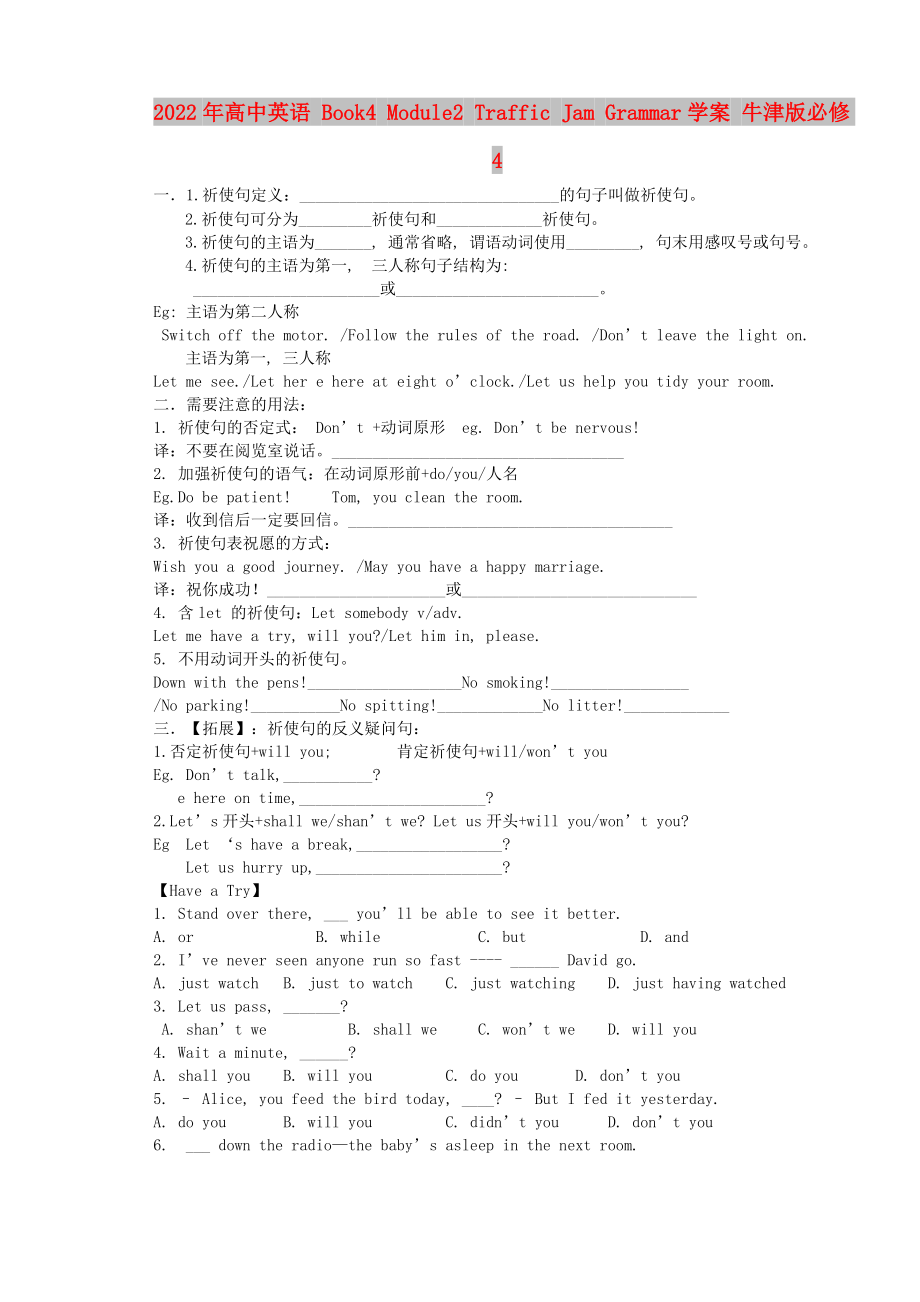《2022年高中英語(yǔ) Book4 Module2 Traffic Jam Grammar學(xué)案 牛津版必修4》由會(huì)員分享,可在線閱讀���,更多相關(guān)《2022年高中英語(yǔ) Book4 Module2 Traffic Jam Grammar學(xué)案 牛津版必修4(2頁(yè)珍藏版)》請(qǐng)?jiān)谘b配圖網(wǎng)上搜索�。
1����、2022年高中英語(yǔ) Book4 Module2 Traffic Jam Grammar學(xué)案 牛津版必修4
一.1.祈使句定義:________________________________的句子叫做祈使句。
2.祈使句可分為_(kāi)________祈使句和_____________祈使句�。
3.祈使句的主語(yǔ)為_(kāi)______, 通常省略, 謂語(yǔ)動(dòng)詞使用_________, 句末用感嘆號(hào)或句號(hào)。
4.祈使句的主語(yǔ)為第一, 三人稱句子結(jié)構(gòu)為:
_______________________或_________________________���。
Eg: 主語(yǔ)為第二人稱
Switch
2�����、off the motor. /Follow the rules of the road. /Don’t leave the light on.
主語(yǔ)為第一, 三人稱
Let me see./Let her e here at eight o’clock./Let us help you tidy your room.
二.需要注意的用法:
1. 祈使句的否定式: Don’t +動(dòng)詞原形 eg. Don’t be nervous!
譯:不要在閱覽室說(shuō)話���。____________________________________
2. 加強(qiáng)祈使句的語(yǔ)氣:在動(dòng)詞原形前+do/you
3��、/人名
Eg.Do be patient! Tom, you clean the room.
譯:收到信后一定要回信�。________________________________________
3. 祈使句表祝愿的方式:
Wish you a good journey. /May you have a happy marriage.
譯:祝你成功���!______________________或_____________________________
4. 含let 的祈使句:Let somebody v/adv.
Let me have a try, will
4�����、 you?/Let him in, please.
5. 不用動(dòng)詞開(kāi)頭的祈使句�。
Down with the pens!___________________No smoking!_________________
/No parking!___________No spitting!_____________No litter!_____________
三.【拓展】:祈使句的反義疑問(wèn)句:
1.否定祈使句+will you; 肯定祈使句+will/won’t you
Eg. Don’t talk,___________?
e here on time,___
5���、____________________?
2.Let’s開(kāi)頭+shall we/shan’t we? Let us開(kāi)頭+will you/won’t you?
Eg Let ‘s have a break,__________________?
Let us hurry up,_______________________?
【Have a Try】
1. Stand over there, ___ you’ll be able to see it better.
A. or B. while C. but D. and
2. I’
6、ve never seen anyone run so fast ---- ______ David go.
A. just watch B. just to watch C. just watching D. just having watched
3. Let us pass, _______?
A. shan’t we B. shall we C. won’t we D. will you
4. Wait a minute, ______?
A. shall you B. will you C. do you D.
7�����、don’t you
5. – Alice, you feed the bird today, ____? – But I fed it yesterday.
A. do you B. will you C. didn’t you D. don’t you
6. ___ down the radio—the baby’s asleep in the next room.
A. Turning B. Turned C. Turn D. To turn
7. – How about a film tonight?
– _
8�、___ I haven’t been to the cinema for a long time.
A. Yes, thank B. Why not? C. No, go away D. It’s a pity.
Language points:
1.switch off/on____________=switch sth. off/on同義詞組_______________
follow:(v)________________________________________________等意思。
【Exercises】What’s the meaning of
9���、the underlined words?
⑴ He followed her out of the room.( )
⑵ You can follow this route.( )
⑶ I don’t quite follow you.( )
⑷ I was only following orders.( )
2.keep cool_________________
3.Leave the motor on.__________________ “l(fā)eave+n+adv”
“l(fā)eave
10����、+賓語(yǔ)+賓補(bǔ)”的復(fù)合結(jié)構(gòu):Leave+n/pron+n/adj/adv/prep phrase/doing/done/to do
Eg.⑴ Her parents ________________________(讓她自己選擇朋友)
⑵ _____________________________(不要讓他等)outside in the rain.
⑶ Don’t ____________________(讓孩子呆在家里) alone.
4.blow(v)__________ 過(guò)去式___________過(guò)去分詞____________.
blow……down/off/
11、over_________________________
blow out________________ blow up________________ blow your horn______________
5.react(v)_______________(n)_____________,_______________
搭配:react to_______________ react with _______________________
react on ______________________reaction to _____________________
Eg.她對(duì)這個(gè)消息反應(yīng)如何���?How did she _____ _____the news?
 2022年高中英語(yǔ) Book4 Module2 Traffic Jam Grammar學(xué)案 牛津版必修4
2022年高中英語(yǔ) Book4 Module2 Traffic Jam Grammar學(xué)案 牛津版必修4

